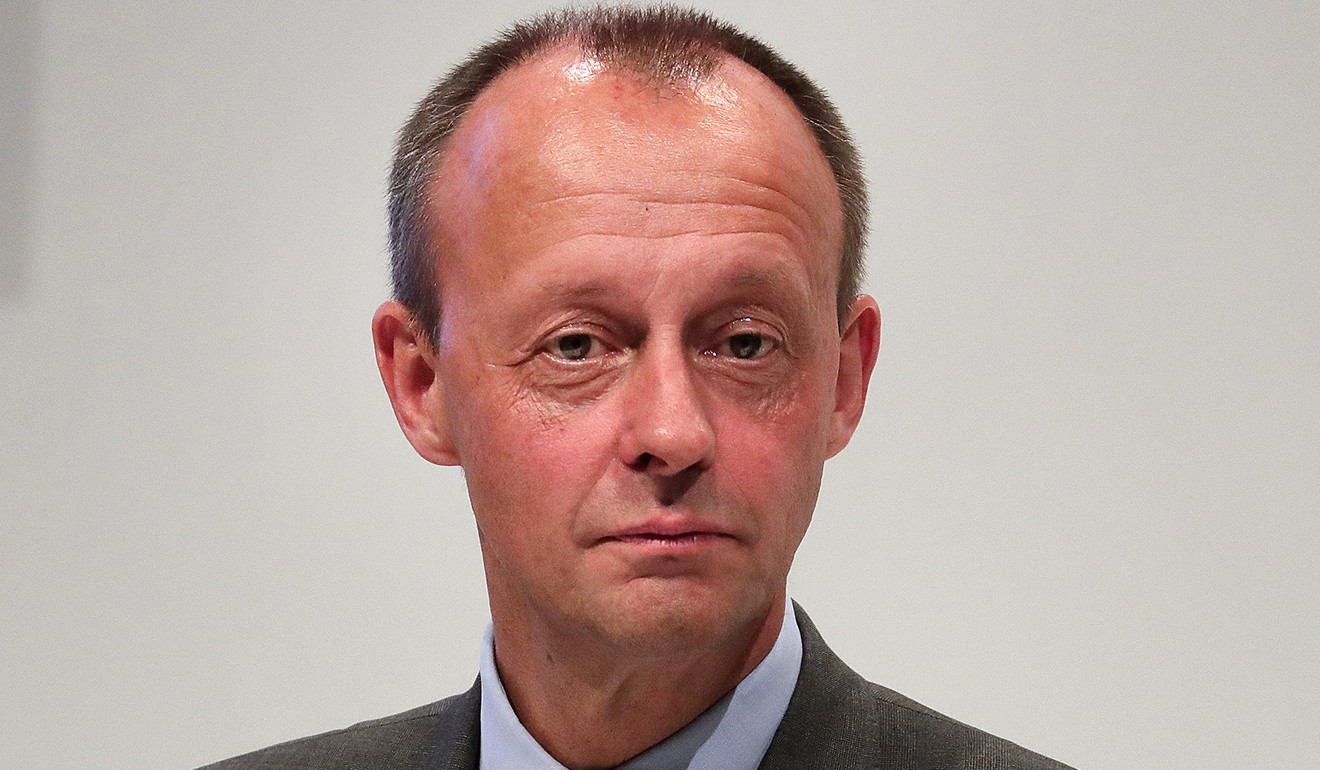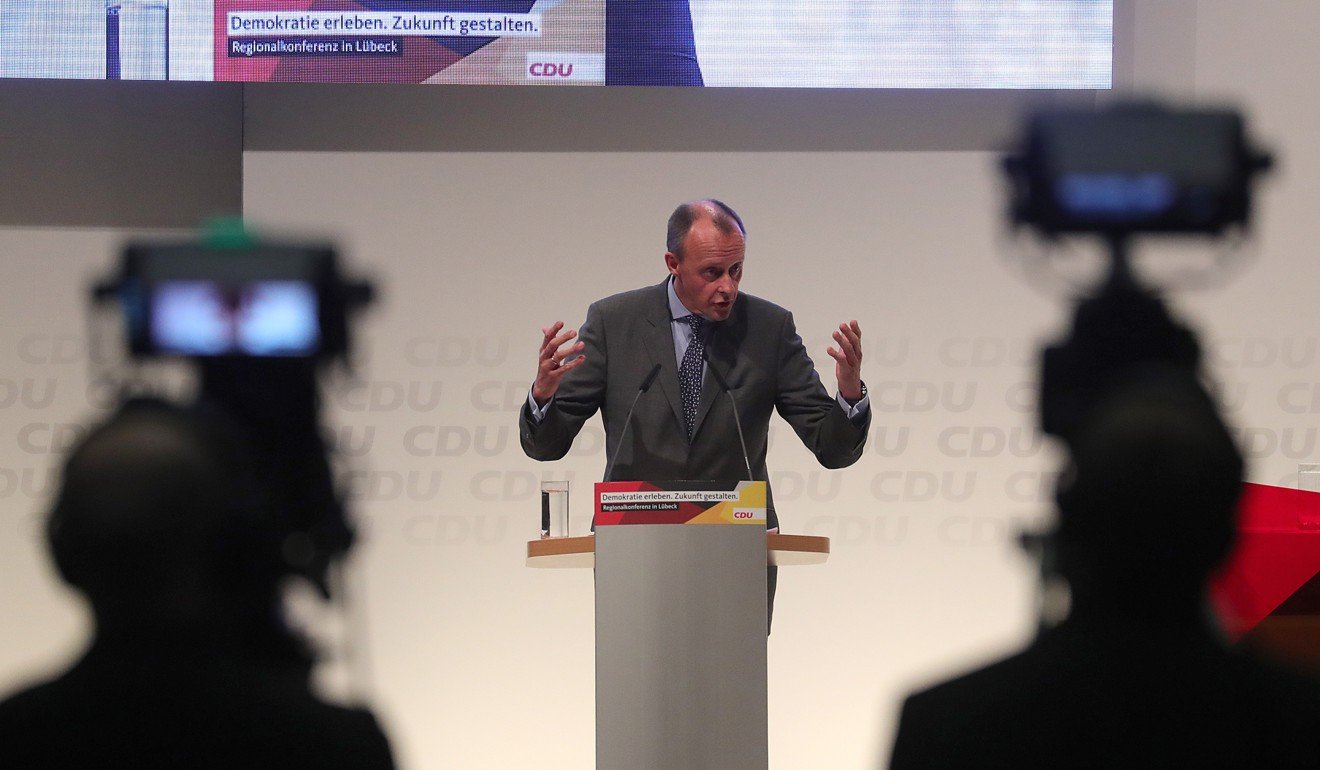
The ‘anti-Merkel’: two private jets but I’m only ‘upper middle class’, says German conservative contender Friedrich Merz
- Friedrich Merz, front runner to take over leadership of Germany’s main conservative party, says ‘middle class’ is more about moral values than monetary ones
- Merz, who made a fortune in the financial sector with annual earnings topping US$1million, stands in contrast to frugal Angela Merkel
A front runner to take over from Angela Merkel as leader of Germany’s main conservative party is facing criticism for describing himself as “upper middle class” despite having amassed a fortune working in the financial sector and owning two private jets.
Friedrich Merz, 62, who has been selling himself as the man who can save Germany from political and economic stagnation, and is seen as the most likely to succeed Merkel as head of the Christian Democratic Union (CDU), was forced to disclose this week that his annual earnings amounted to around €1 million (US$1.14million). The size of his personal fortune is not known but is estimated to run to several million euros.

The revelations over Merz’s wealth are seen as the biggest threat to his candidacy. The CDU is aware that having haemorrhaged millions of votes at recent elections, it cannot afford to alienate the electorate by having as a leader someone who highlights the growing rich-poor divide in Germany.
Critics have described Merz as the “anti-Merkel” as he differs from her immensely in everything from his political style to his attitudes towards wealth accumulation. The weekly news magazine Der Spiegel said he was a “gilt-edged candidate” who, if he ever became chancellor, would be the first to fly his own private plane. “Money was never a driving force for Merkel, but that’s not what one can say of Merz,” it said.
Angela Merkel’s exit may mean a policy shift for China in Europe
Over her 13 years as chancellor, Merkel has cultivated an image – highly popular with German voters – as a spendthrift who takes modest hiking holidays, repeatedly wears the same clothes and makes her own potato soup.

Merz left politics in 2009, having been sidelined by Merkel, and moved into the private sector. Among his several roles, he is chair of the German arm of BlackRock, the US investment firm, and does work for the US law firm Mayer Brown. According to annual reports, he was paid €125,000 by BlackRock, €80,000 by the toilet paper manufacturer Wepa Industrieholding, €75,000 by Bank HSBC Trinkhaus, and €14,000 by the Cologne-Bonn airport.
If I think of upper class or elite, I think of people who have inherited money or a company and enjoy their life as a result of that. That’s not the case with me
In a round table interview with readers of the tabloid Bild, he described himself as “upper middle class”, which drew accusations that he had lost touch with reality.
Merz tried to justify the claim, arguing that the term related more to moral values than monetary ones. “For me the middle class is not a purely economic realm,” he said. “From my parents I learned the values which characterise the middle class, including hard work, discipline, decency, respect and the knowledge that one gives something back to society if one can afford it.
“If I think of upper class or elite, I think of people who have inherited money or a company and enjoy their life as a result of that. That’s not the case with me.”
The idea of a rich chancellor – albeit a self-made millionaire – is likely to sit uncomfortably with many Germans, and some commentators said the revelations about Merz’s wealth could endanger his efforts to portray himself as a man of the people.
“There is no doubt purely on the basis of his earnings that Herr Merz belongs to the higher levels of the upper class,” Prof Gerhard Bosch, a sociologist, told the Süddeutsche Zeitung.
These are Germany’s contenders to replace Merkel. It’s a stark choice
Merz’s criticism of Merkel’s leadership style, most notably what he sees as her failure to secure a mandate from the Bundestag to open the country’s doors to refugees in 2015, has earned him support from some of the chancellor’s most vehement critics in the party.
His candidacy also benefits from the fact he has been out of the political arena for years and is therefore not tarnished like others in the thick of political life who are making a play for Merkel’s post.
Thomas Druyen, a wealth expert at Sigmund Freud University, said Merz was only modestly wealthy by international standards, and Germans were unusual in their hostility towards the rich.
“Someone like [Michael] Bloomberg, the former mayor of New York, is a billionaire who would laugh at Herr Merz’s income,” he told the broadcaster Deutschlandfunk. “But the point is, in Germany we have another tradition. We’ve tried since the war to build up a middle-class-oriented, well-structured society in which one can be successful but remain transparent. The very rich people or big companies are somehow just not trusted. It’s rather absurd, but it belongs to our psychological DNA.”
The other key contenders for the CDU post are Annegret Kramp-Karrenbauer, a Merkel loyalist, and Jens Spahn, the rightwing health minister. The party will vote early next month.

